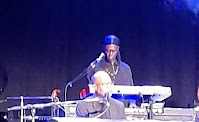This was clearly a Gil Scott Heron tribute set and he claimed his friend and musical partner was one of the greatest poets of C20th. In my view he was one of many great artists from C20th music.
He offered Home is Where the Hatred Is as exhibit A, originally on Pieces of a Man and then on the collaborative album It’s Your World.
Exhibit B was the track Pieces of a Man, played on solo piano with some light bass towards the end.

Early on he said it was okay for people to move, so he seemed somewhat tentative inviting audience participation and, despite the obvious presence of a significant number of people who clearly knew their Gil Scott Heron, clapping and singing along was patchy and sporadic, but once it got going, he seemed amazed and delighted.
Gil Scott Heron made many fine records but two stand out in my view, both with Brian Jackson. I was DJing when he died in 2011 and played Winter in America in tribute and played it again on my radio show ahead of this. A stunning, sublime, magnificent piece of music. His Musical Director, who’d played mostly keyboards and occasional guitar, played flute on this, which was slightly disappointing until he and Jackson switched roles for the solo. Incidentally it isn’t on the Winter in America album but can be found on First Minute.
The title track of It’s Your World followed and Tony Dudley Evans could be seen prowling as the finishing time passed, when they quickly played Little Orphan Boy, an old song on his new album This is Brian Jackson, which was good; up-tempo with some scatting and reminiscent of Brazilian singer and pianist Ed Motta, who I’m sure was influenced by them, but the audience were clearly becoming restless.
I first came across Gil Scott Heron in the mid-seventies when The Bottle was an unlikely guaranteed floor-filler on the northern soul scene. Its popularity continued through jazz-funk and it became a classic in the clubs alongside future club classics. Gil became an icon of the hip-hop generation, mostly because of his very earliest, pre-Jackson albums and somewhat misplaced in my view, but also became a feature of the pop history evolving in the media which couldn’t really ignore a genuine revolutionary amongst all the pretend ones.
Without missing a beat, we even got the uno dos tres cuatro and the place erupted at last. Sadly no flute from either and it seemed a little rushed, but the night was complete. Steve T



No comments :
Post a Comment